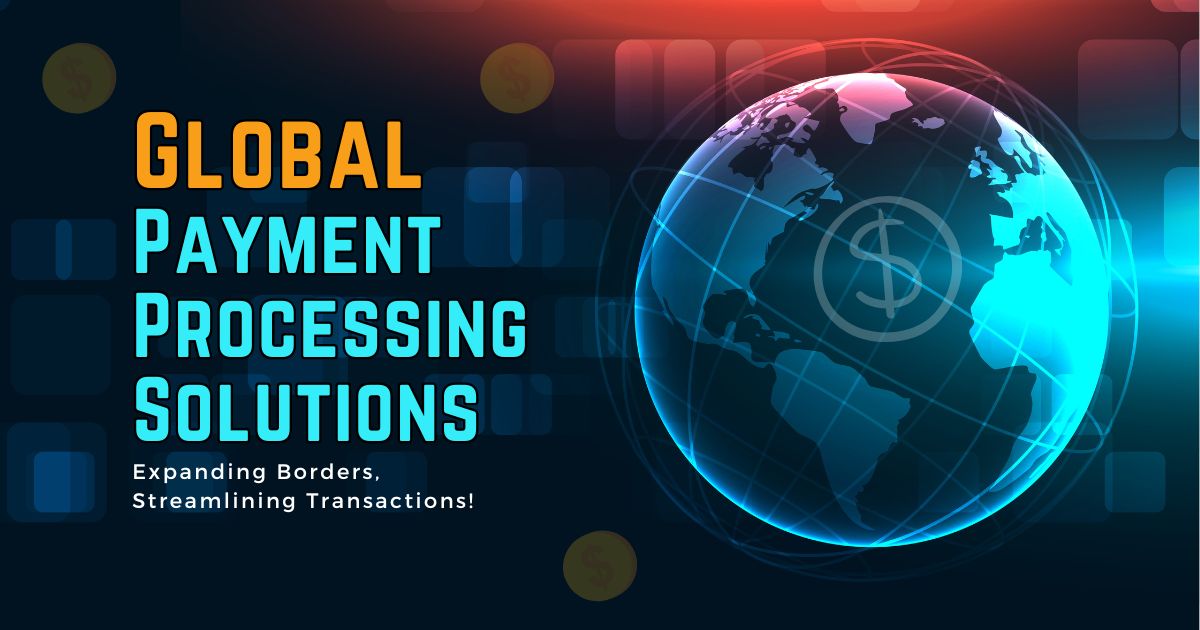
| February 20th, 2024 |
Global Payment Processing Solutions — Expanding Borders, Streamlining Transactions!
In an interconnected world where commerce knows no borders, businesses are constantly seeking efficient and reliable international payment processing solutions. Whether you’re a small startup or a multinational corporation, navigating the complexities of global transactions requires careful consideration of various factors, from currency conversion to compliance with local regulations. This blog post delves into the realm of international payment processing, exploring the challenges, trends, and solutions that can help businesses streamline their financial operations on a global scale.
The Landscape of International Payments —
Globalization has transformed the way businesses operate, with many expanding their reach beyond domestic markets to tap into international opportunities. As a result, the demand for seamless cross-border payment solutions has never been higher. However, conducting transactions across different countries and currencies comes with its own set of challenges:
Currency Conversion:
Dealing with multiple currencies can lead to exchange rate fluctuations and additional fees, impacting the overall cost of transactions.
Compliance and Regulation:
Each country has its own regulatory framework governing financial transactions, making compliance a complex issue for businesses operating globally.
Security and Fraud Prevention:
With the rise of cybercrime, ensuring the security of international payments is paramount to protect sensitive financial information and prevent fraudulent activities.
Speed and Efficiency:
In today’s fast-paced business environment, the speed of transactions is crucial. Delayed payments can disrupt supply chains and hinder business operations.
Key Players in International Payment Processing —
To address these challenges, businesses rely on a variety of payment processing solutions offered by financial institutions, fintech companies, and payment service providers (PSPs). Some of the key players in the international payment processing ecosystem include:
Traditional Banks:
Established financial institutions offer a range of international banking services, including wire transfers, foreign exchange services, and letters of credit. While banks provide stability and reliability, their services may be more costly and less agile compared to newer fintech solutions.
Fintech Innovators:
Fintech startups are disrupting the financial industry with innovative payment solutions designed to simplify cross-border transactions. These include digital wallets, peer-to-peer payment platforms, and blockchain-based payment networks, offering lower fees, faster processing times, and greater transparency.
Payment Gateways:
Payment gateways act as intermediaries between merchants and customers, facilitating online transactions and securely transmitting payment data. Many payment gateways now offer international payment processing capabilities, enabling businesses to accept payments from customers worldwide.
Cryptocurrency Platforms:
With the rise of digital currencies like Bitcoin and Ethereum, some businesses are exploring cryptocurrency as a means of international payment. Cryptocurrency transactions offer decentralization, lower fees, and faster settlement times, although regulatory uncertainty and price volatility remain concerns.
Choosing the Right Payment Solution —
Selecting the right international payment processing solution depends on various factors, including the nature of your business, target markets, transaction volumes, and risk tolerance. Here are some considerations to keep in mind:
Cost:
Compare the fees charged by different payment solution providers, including transaction fees, currency conversion fees, and any additional charges. Look for transparent pricing structures to avoid unexpected costs.
Speed and Efficiency:
Assess the processing times for international transactions, taking into account factors such as settlement times, currency conversion speed, and fund availability.
Security:
Prioritize payment solutions that offer robust security features, such as encryption, tokenization, and multi-factor authentication, to protect against fraud and data breaches.
Compliance:
Ensure that the payment provider complies with relevant regulations in both your home country and target markets, particularly concerning anti-money laundering (AML) and know your customer (KYC) requirements.
Customer Experience:
Consider the user experience for both merchants and customers, including the ease of integration, checkout process, and support for multiple payment methods and currencies.
Emerging Trends in International Payments —
The landscape of international payment processing is continually evolving, driven by technological advancements, changing consumer preferences, and regulatory developments. Some notable trends shaping the future of global payments include:
Mobile Payments:
With the widespread adoption of smartphones and mobile banking apps, mobile payments are becoming increasingly popular for both domestic and international transactions. Mobile wallets and payment apps offer convenience, speed, and accessibility, particularly in emerging markets with limited banking infrastructure.
Cross-Border E-Commerce:
The growth of cross-border e-commerce is driving demand for seamless payment solutions that cater to global shoppers. Businesses are leveraging localization strategies, multi-currency pricing, and alternative payment methods to enhance the shopping experience and boost international sales.
Embedded Finance:
The integration of financial services into non-financial products and platforms, known as embedded finance, is blurring the lines between banking and other industries. This trend is enabling businesses to offer integrated payment solutions, such as buy now, pay later (BNPL) options and subscription billing, directly within their platforms.
Central Bank Digital Currencies (CBDCs):
Several central banks worldwide are exploring the development of digital currencies issued and regulated by governments. CBDCs have the potential to streamline cross-border payments, reduce transaction costs, and enhance financial inclusion, although challenges such as privacy concerns and interoperability remain.
Conclusion —
As businesses continue to expand their global footprint, the need for efficient and reliable international payment processing solutions will only grow. By understanding the challenges, exploring emerging trends, and choosing the right payment partners, businesses can navigate the complexities of cross-border transactions and unlock new opportunities for growth and innovation in the global marketplace. Whether leveraging traditional banking services, embracing fintech innovation, or experimenting with emerging technologies like cryptocurrency, businesses must prioritize security, efficiency, and compliance to succeed in the dynamic world of international payments.
